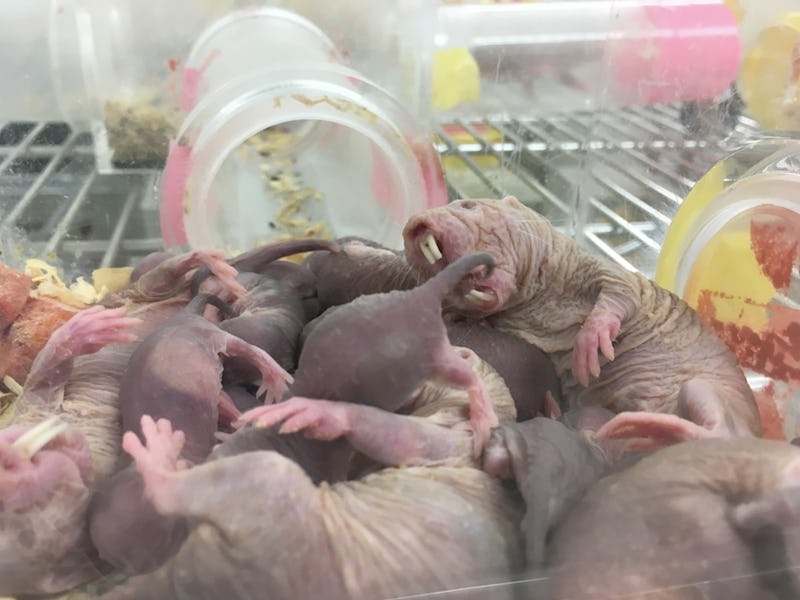Poop-Eating Animals Show a Bizarre Social Upside to Coprophagy
We still don't recommend it.

Once you eat somebody’s poop, there’s an undeniable bond between the two of you. That’s especially the case if you’re a naked mole rat (Heterocephalus glaber), one of the strangest mammals in the world. The naked mole rat lives more like a bee or ant than a rodent, forming eusocial colonies of dozens of naked mole rats in which each individual has a specific role. In these colonies, one female queen breeds with just a small number of males, while all other females remain infertile. Scientists have come up with many ideas for the processes behind this reproductive structure, and new research sheds light on how queens maintain control over the other females: It’s all about eating poop.
In a paper published Monday in the journal Proceedings of the National Academy of Sciences, a team of researchers across four Japanese universities presented evidence that when subordinate females eat the queen’s feces while she’s pregnant, they ingest the sex hormone estradiol, which makes them more likely to care for the queen’s newborn offspring. The practice of eating feces — called “coprophagy” — is not unique to naked mole rats. But they may be some of the only animals for whom it serves a purpose of social control.
This latest research shows that even though naked mole rat societies bear a striking resemblance to those of colony insects, the biology underlying the mammal’s colonies is quite different. Ant, bee, and wasp queens use pheromones to suppress fertility and induce servile behavior in their subordinates, but researchers have known for over a decade that naked mole rats lack the organs that would enable them to detect such hormones. Therefore, scientists knew the queen must be controlling her subjects in some other way. Furthermore, if caretaking behavior is linked to hormone secretion (which researchers have found to be consistently true among mammals), how could these subordinate naked mole rats be motivated to care for someone else’s young if they don’t produce the proper hormones?
Since poop is such an ever-present fixture in the naked mole rat’s underground colonies — the naked mole rat regularly eats poop, both to help maximize nutrient absorption and to pass on microbiota that help them digest the tough plant matter they eat — the researchers thought the poop might have something to do with it.
Naked mole rats are the longest-lived rodent, living up to 30 years.
To test this hypothesis, the researchers fed pellets containing a queen’s feces to subordinates and measured how responsive they were to the cries of baby naked mole rats. The experiment included two types of pellets: pellets containing the feces of a pregnant queen, and pellets containing the feces of a nonpregnant queen that were supplemented with estradiol. Both groups of subordinates responded similarly to the cries of young naked mole rats, suggesting that the estradiol produced by the queen and excreted in her feces could be a key component that induces subordinates to look after her young.
The researchers conclude that, as the pregnant queen produces estradiol, her subordinates consume it in her feces, priming them to be more responsive to the needs of her offspring. And even though the queen stops producing estradiol after giving birth, the interaction with the pups may continue to stimulate the subordinates’ maternal instincts.
To confirm these results, researchers will need to demonstrate that adult subordinates do indeed seek out and eat the queens feces, something that there isn’t a lot of evidence to support. It’s possible that this poop-hormone-transport mechanism is just one of a few ways in which the queen controls her subjects, but this is the first time it’s been identified, and it’s the only instance of this phenomenon in the animal kingdom. Just don’t try it on your friends to trick them into babysitting.